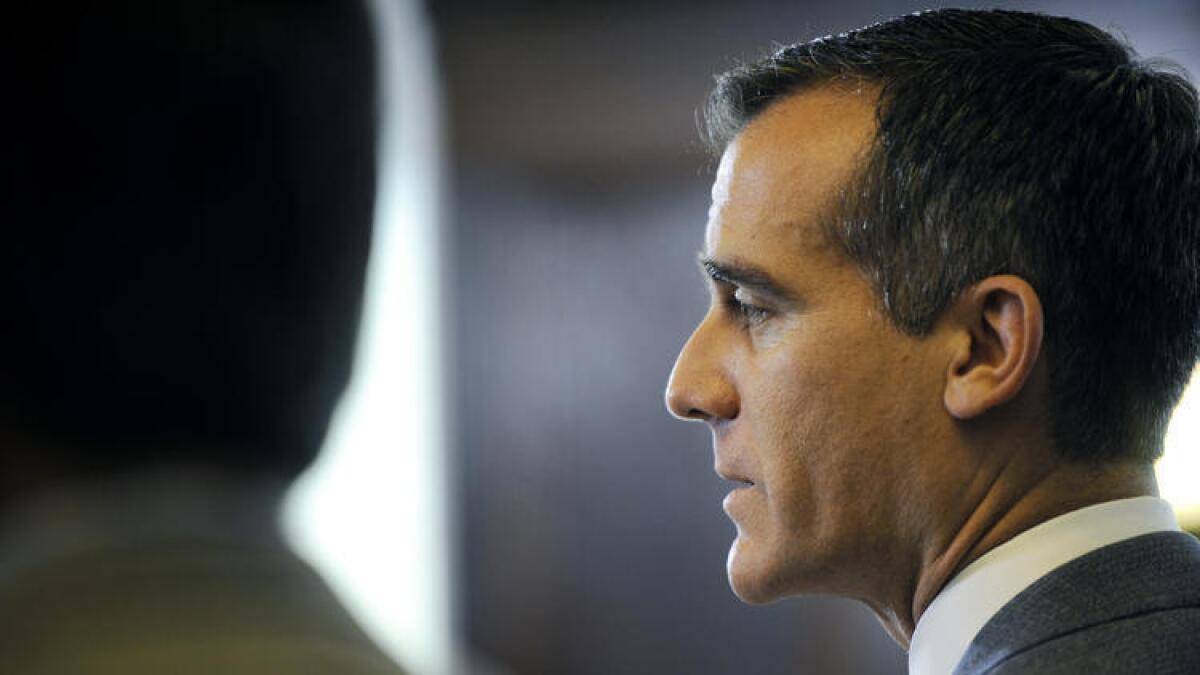Garcetti talks up economic recovery in 2016 State of City speech

Mayor Eric Garcetti addressed L.A.’s economy during his 2016 State of the City speech.
Mayor Eric Garcetti sought to draw attention to Los Angeles’ march toward economic recovery during his annual State of the City speech Thursday, celebrating declining unemployment even as he acknowledged that many Angelenos — including tens of thousands who sleep on the streets each night — have missed out on the benefits of rebounding jobs and real-estate development.
In the speech, delivered at the Harbor City headquarters of an LED lighting manufacturer, Garcetti struck a delicate balance: claiming credit for the city’s improving economy while addressing other important measures of civic health, such as violent crime and homelessness, that have grown worse on his watch.
Unlike his first two State of the City speeches, Garcetti’s address Thursday did not feature announcements of significant new mayoral initiatives. However, he did say he would be helping to drum up financial support for a program offering Los Angeles Unified School District students a free year of community college.
School officials had not previously announced the program, which resembles President Obama’s proposal in his 2015 State of the Union address to offer two free years of community college for all U.S. students. Los Angeles Community College District board President Scott Svonkin said Garcetti had agreed to raise $1.5 million toward the program, splitting its initial $3 million cost with the district.
In its broad framing around policies meant to encourage prosperity, the speech seemed calculated to tap into the concerns over income inequality that have come to dominate politics at both the local and national level in 2016. On that front, Garcetti pointed to one of his administration’s signal legislative achievements: The passage last summer of a $15 citywide minimum wage, which he called “the largest anti-poverty measure in our city’s history.”
But Garcetti’s economic message wasn’t purely populist. Indeed, it was obviously intended to appeal to an audience other than the progressive Democrats who have advocated for low-wage workers: the business owners and developers who have helped fuel L.A.’s revival and have long complained of bureaucratic obstacles at City Hall. Garcetti said tax reductions and holidays enacted by his administration had resulted in $160 million in savings for businesses.
“When I raised my hand to become your mayor, I described City Hall as a place where jobs came to die,” he said. Three years later, he added, “City Hall is widening the circle of opportunity … and we’re seeing those benefits ripple across every corner of our city.”
To illustrate that success, Garcetti cited jobs data, asserting that the city was not simply being buoyed by the nation’s broader economic recovery. He noted that unemployment in L.A. dropped more steeply last year than in California and the U.S. as a whole.
“Some may say that this is just coincidental, that we’re riding a national wave. But that’s not what the numbers say,” he said. “In Los Angeles, we’re not riding the wave. We’re creating one.”
A somewhat different picture emerges from a more thorough review of the numbers themselves.
In February, when the city’s most recent jobs data was published by the UCLA Anderson School of Management, L.A.’s unemployment rate was 5.8%. That was higher than both the state’s 5.5% unemployment rate and the U.S. unemployment rate of 4.9%. Since Garcetti assumed office in June 2013, L.A.’s economy has added 109,000 jobs, a 6% increase. The number of jobs in California increased 5.8% over the same period.
Raphael Sonenshein, executive director of the Pat Brown Institute for Public Affairs at Cal State L.A., said it’s standard practice for mayors to take credit or reap blame based on their cities’ economic fortunes.
“When things go badly, no matter how much they explain that mayors don’t control the economy, they really do get punished for it,” Sonenshein said. “When things are going decently, it’s reasonable to take a reasonable amount of credit.”
Toward the end of his speech, Garcetti also looked ahead to a series of contentious November ballot measures in which he and other elected officials will ask voters to approve billions in funding to expand public transportation and house the homeless.
Garcetti said the budget he is scheduled to release next week includes $138 million to reduce homelessness, a figure in excess of the $100 million the City Council pledged last year but that has so far failed to materialize. It is unclear whether the council will approve the mayor’s suggested spending level.
[email protected] | @petejamison
See more of our top stories on Facebook >>
ALSO
Board recommends parole for Charles Manson follower Leslie Van Houten; victim’s daughter outraged
In a win for unions, appeals court reverses ruling that threw out teacher tenure in California
High-tech nut bandits cost Central Valley packers millions last year
More to Read
Sign up for Essential California
The most important California stories and recommendations in your inbox every morning.
You may occasionally receive promotional content from the Los Angeles Times.












